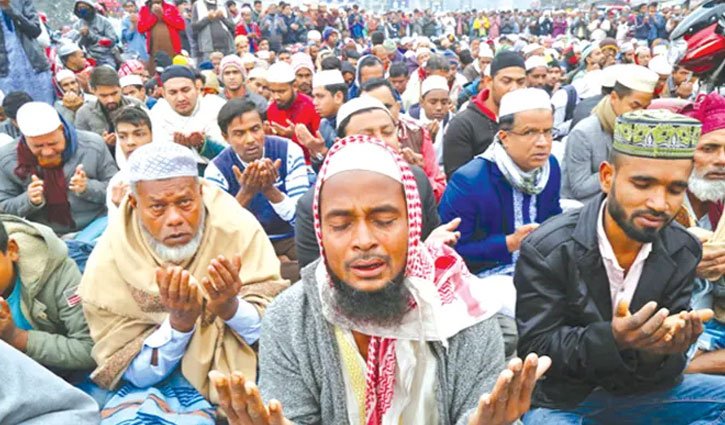Dhaka Office: The first phase of the three-day Bishwa Ijtema ended on Sunday (February 2) with Akheri Munajat, or final prayer, at the Ijtema ground at Tongi in Gazipur, seeking peace, prosperity, and the welfare of the world and Muslim community.
The Akheri Munajat, conducted by Maulana Zubair Ahmed, the top cleric of Tablig Jamaat Bangladesh, and the Pesh Imam and Khatib of Kakrail Jame Masjid, began at 9:15am.
The final prayer ended at 9:36 am, seeking blessings for Muslims across the world.
Thousands of devotees sought mercy from Almighty Allah by raising their hands for divine forgiveness, blessings for peace and prosperity of the Muslim Ummah. They also prayed for the country’s welfare.
Earlier on January 31, the first phase of the 58th Bishwa Ijtema, one of the largest congregations of Muslims, began on the banks of Turag river in Tongi, Gazipur on the outskirts of the capital.
The Ijtema commenced with Aam Bayan (general sermons) by renowned scholars, including Pakistani religious cleric Maulana Ziaul Huq, following Fajr prayers. It will conclude with Akheri Munajat (final prayers) on Sunday.
Several thousands of Muslim devotees from home and abroad participated in the Jummah prayers, led by Maulana Jubayer Ahmed.
This year, the Ijtema, organised by Tablig Jamaat, will be held in three phases. The first phase will continue until February 2.
The second phase is scheduled from February 3 to 5, while the third phase will take place from February 14 to16.
Devotees from parts of Dhaka and 41 other districts will participate in the first phase, while devotees from the remaining parts of Dhaka and 22 other districts will attend the second phase.
The Akheri Munajat for the first phase will be held on February 2, while the Akheri Munajat for the second phase will take place on February 5.
Followers of Maulana Muhammad Saad Kandhlawi will participate in the third phase scheduled to be held from February 14 to 16.
Strict security measures have been taken in and around the Ijtema ground to ensure the safety of devotees.
The entire Ijtema ground and its surrounding areas have been brought under CCTV surveillance, with control rooms and security archways installed at all entry points to enhance security.

